by Cosimo Spangler
“Would you live forever, never die, while everything around passes?” Adrianne Lenker burned these ten words into my mind when I saw her band Big Thief live in concert last week. Although their ballad “Change” is usually read as a testimony to the beauty of human love, the transient nature in which the topic is handled is what has stuck with me since I witnessed them performing the song. Since then, I’ve been thinking about this concept of eternal life in a different context. What is our future and that of future generations going to look like? Do we want to live forever? Or do we fight to prevent everything around us from passing? “Bigger Than Us” is a story about young people who have to confront themselves with this question.
Becoming active for humanity
I think I speak for a majority of my generation’s peers when I say that I’m frustrated. The people in power in our society don’t want to confront themselves with the big issues of our time – or so it seems – even though they are so painfully obvious. But I think the lack of initiative and change among our world leaders can be explained by one fact: they are, for the most part, simply not affected by these issues. They can see that everything around them slowly (or scarily quickly) passes, but as long as their homes are safe they can live forever, or so they think. It is not before they can ultimately directly feel the threats themselves that political action will ensue. But by then, when minorities will have been marginalized in society, the global south ached under the pressures of climate change, and our wildlife been decimated, there will be no one but themselves to protect. This is what it means to have political privilege.
Sadly, many young activists have to face critics who are quick to turn their privileged positions into wicked judgement over their cause. “You can only complain about these matters because you live in a place where you have the ability, freedom, and time to do so”, or something along those lines. These redundant arguments often come from conservative naysayers who are reluctant towards any political change that could affect their privilege. Nevertheless, it is extremely important to realize: activism is not born from privilege; it is born from oppression at best, and existential threat at worst.
Today, I am lucky to have the opportunity to talk about a story that proves this fact and explores the spirit of activism among my generation in our day and age.
“Bigger Than Us”—A story about the spirit of activism
“Bigger Than Us” is a 2021 documentary picture by French journalist and director Flore Vasseur, which garnered international attention at the 2022 Cannes Film Festival and has come to German theaters in February 2023. The story follows Indonesian youth activist Melati Wijsen as she travels around the world in search of like-minded people on her quest for more equality and justice. Throughout her journey the stories of the seven protagonists become intertwined in their mission of trying to make the world a better place. With Melati’s help the viewer can tie together the motives, situations and viewpoints of the young activists. The goal: to find truths about the spirit of modern day activism.
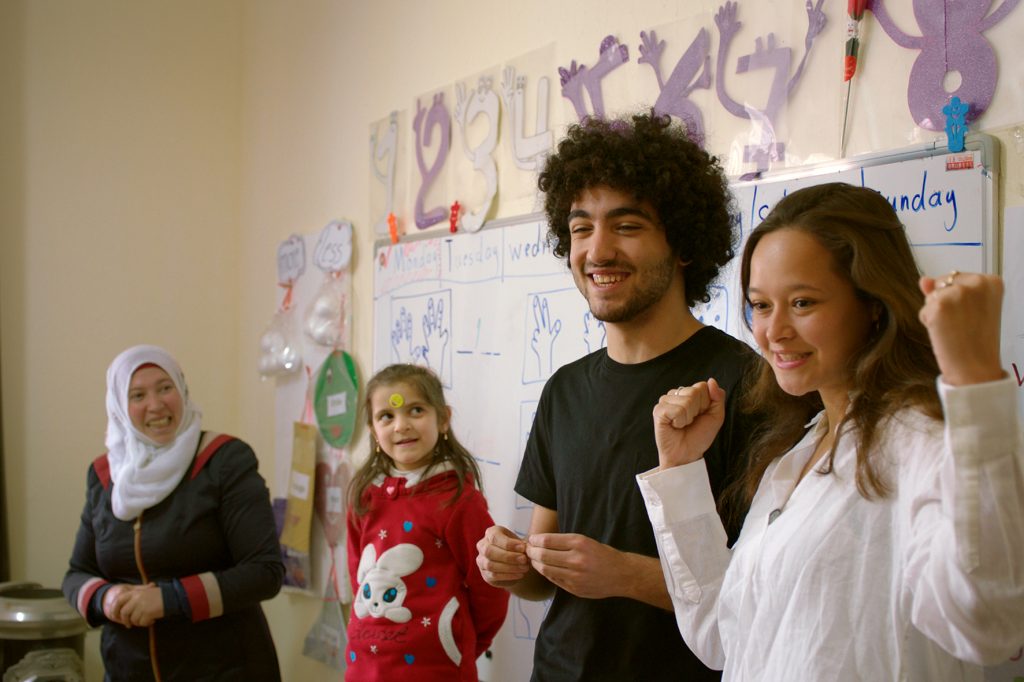
One of these truths reveals itself pretty quickly. Although their causes are vastly different from one another, the activists’ motivations stem from similar places: most of their actions are merely responses to the exploitation and oppression they’ve had to endure as part of particular minorities. Mohamad, a Syrian war refugee, stands up for children’s education in Libanon; Memory, a young woman from Malawi, fights for the emancipation and rights of women in her homeland; Rene, a young Brazilian man, founded and now authors an independent newspaper for the Favelas in Rio de Janeiro to battle information sovereignty of the corrupt Brazil government.
Seven Protagonists struggle for humanity
All of the seven protagonists fight for better conditions in their own way and pace. Their activism has been shaped by the inequality and injustice they’ve had to endure their whole lives. Many of them just children when they first started taking action, these young people all know through their negative experiences that the world can never become a better place as long as we allow world leaders, presidents, and corrupt regimes to maintain those systems that exercise discrimination. Patriarchy, capitalism, and racism all serve the same cause: maintaining power.
Human values that build the framework for activism
Through their many experiences, both good and bad, the activists seem to have gained a common set of values that build the foundation for their vision of an inclusive society. The movie puts a lot of emphasis on showcasing these values. One example is the importance of free access to education, which many minorities everywhere around the world don’t have. Mohamad has made it his personal goal to build schools for refugee children in order to give them real perspectives for their lives. According to him, children that feel worthless waste their lives. And it shows: the children enjoy going to school, learning new things, socialising with another.
In fact, Mohamad’s school is so successful that since its opening there hasn’t been a single absence. Images of children that are happy, that are smiling, that are enjoying themselves no matter their environment are scattered throughout the whole movie. The spirit of the youth is not something that can so easily be defeated. By giving the children opportunities despite the oppression and discrimination they are submitted to, the activists equip them with tools to harvest the fruits of their indomitable spirit.
Climate activism and the fight against natural destruction
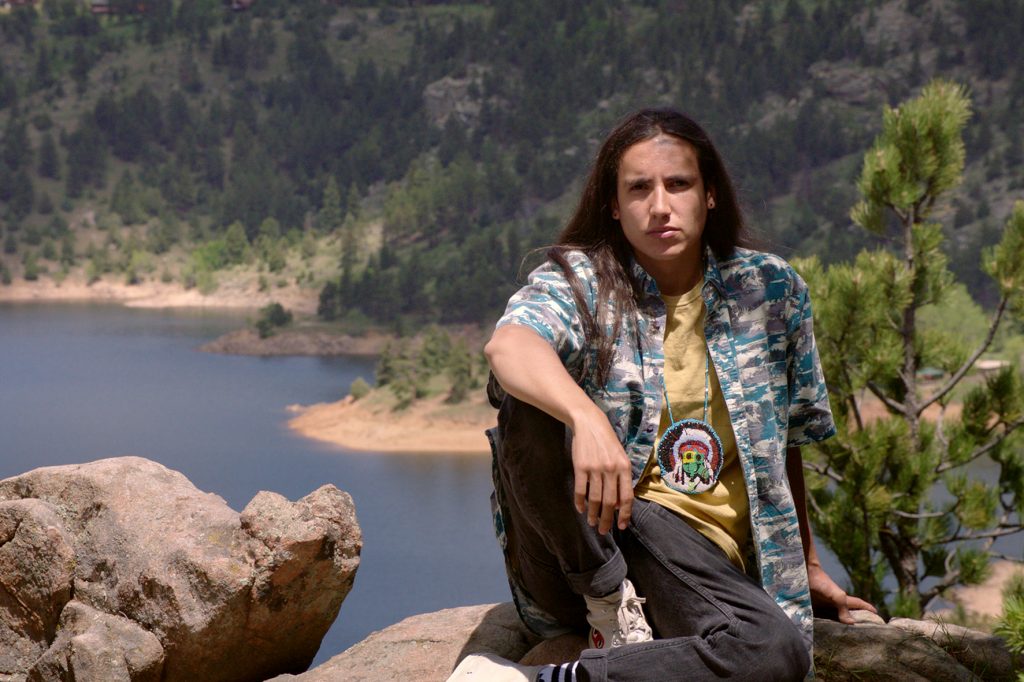
© Plaion Pictures
Xiuhtezcatl, a young American who fights against the destruction of the natural environment and the exploitation of the people of his native tribe, has a more transcendental view on this topic. To him, the spark that gives young activists the motivation to keep on fighting is to re-establish the natural connection we as humans have to our environment, to nature, to our peers, and to ourselves. This connection is strongest when we are young, but as we grow older, the workings of modern capitalist society dulls it. Xiuhtezcatl carries this sentiment from his indigenous heritage over to his climate activism. In order to make a difference, it’s not enough to only protect the land from oil companies: it is necessary to establish a framework of human interaction and mutual understanding.
The struggle between resilience and doubt
But it’s not easy to keep on going no matter what the world throws at you. “Bigger Than Us” displays the absurdity of the situations in which children all around the world find themselves in. Take for example the harrowing imagery of the 3,000 families living on literal mountains of garbage outside Jakarta. It’s hard not to lose hope when the only thing you can see in every direction are thousands of tons of garbage.
Every activist has doubts. “My goal isn’t to make a change, but I want to feel like I belong somewhere”, says Mohamad. Mary, a young volunteer for Refugee Rescue in Mykonos puts it very bluntly: “None of us should be here”. And she’s right, of course. No young person should feel forced to sacrifice their youth to do the things that governments seem not to be able to do: taking care of their people.
Humanity in a refugee camp
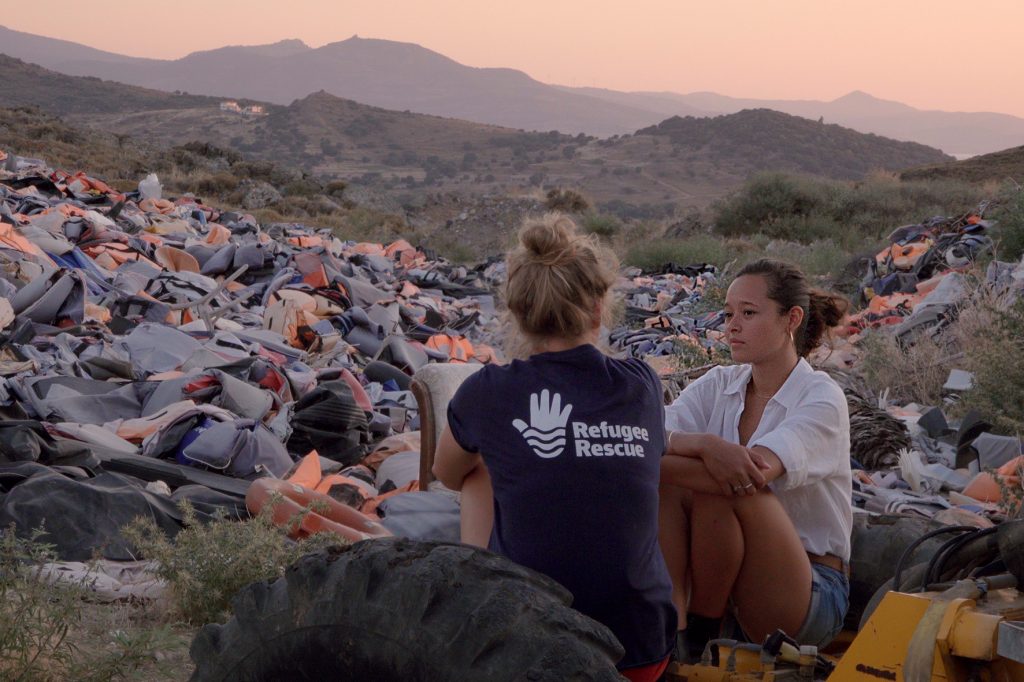
Just as the seven activists have to tread the line between doubt and resilience every day, “Bigger Than Us” displays this bittersweet dichotomy between hope and despair with its imagery. The most emotionally potent moment of the movie comes as a result of that opposition. When Mary and Melati find and rescue a family of stranded refugees from Turkey while patrolling the Greek coastline, moments of pure human kindness are displayed. The family is full of hope and overjoyed to have been found, and even though they can’t properly communicate with the rescue team it’s clear that everyone is full of love and gratefulness for a short time.
The heart-warming scene is immediately juxtaposed by images about Moria, the Greek refugee camp where families can be stuck for years after arriving in Greece. “That moment when they drive away, that’s really hard for me as well” says Mary from her experience with the many families she has helped rescue. The fight between keeping hope and having to deal with the relentlessness of reality is one that many people across the world have to take on every day.
Fighting for humanity: a challenge that is bigger than you
“Bigger Than Us” often accentuates that the young activists are not heroes, but just ordinary teenagers. It’s people like you and me that can change the world, but to do that we have to ask ourselves a question everyday: will we choose comfort or humanity? Should we sink, or go out to sea despite our fears?
People like Melati, Mary or Mohamad are not anomalies, they are role models that show us that the courage and kindness it takes to fight are inside every one of us. They show us that we are not alone. That’s what “bigger than us” really means: not that the struggle for change is too big for us to handle, but that our strength comes from our collectiveness. It means that we have to make connections, share ideas and be loud in our struggle for change. So keep being loud, keep being active, and keep on fighting for your humanity. Because as long as we’re fighting, we have not given up hope yet.
__________
The documentary „Bigger Than Us“ is available in German and English. It was produced by Oscar® winner Marion Cotillard, who has been involved in ecological and social projects for over 20 years: „When I became a mother, I immediately felt that I could learn so much from my children. The new generation is choosing life and human dignity.“
„Bigger Than Us“ – awarded with the rating valuable – will be released on DVD and digitally on all portals on 25 May 2023.
__________
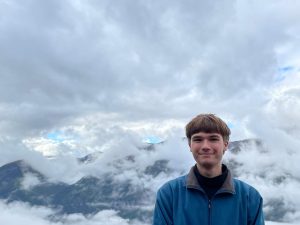 Cosimo is a 19-year-old English student who writes about any- and everything that inspires and interests him. You can find more of his texts on Instagram:
Cosimo is a 19-year-old English student who writes about any- and everything that inspires and interests him. You can find more of his texts on Instagram:
https://www.instagram.com/moe.archives/
This article is protected by copyright.

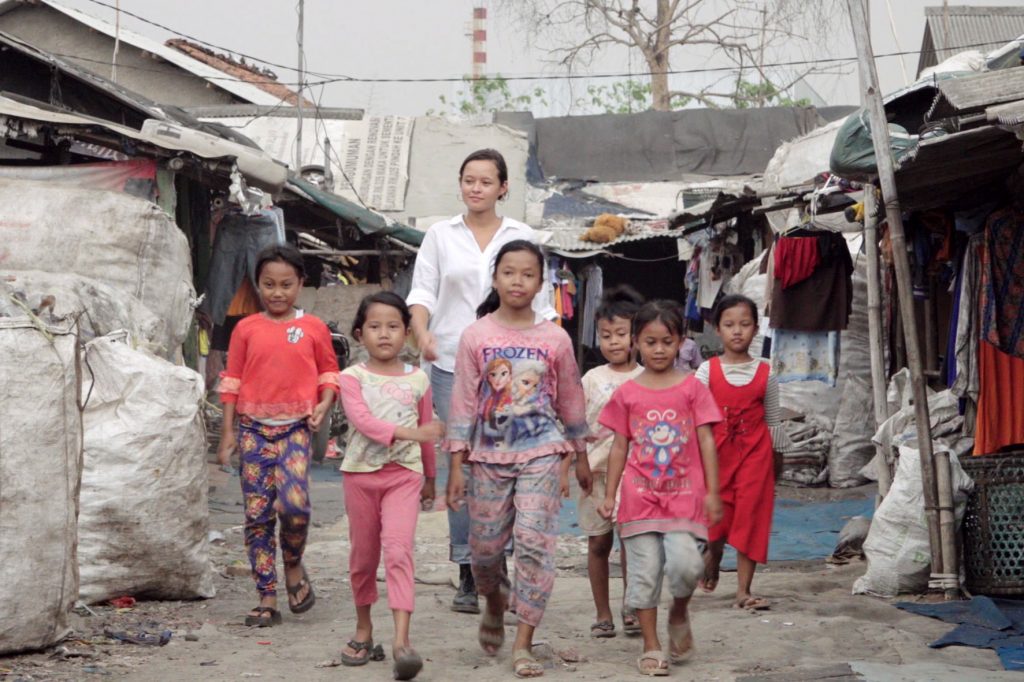



Deine Daten werden verschlüsselt übertragen. Deine IP-Adresse wird nicht erhoben.
Infos zum Datenschutz